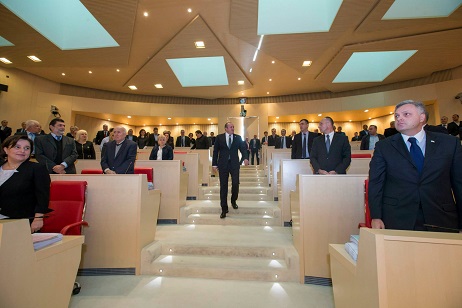President Margvelashvili: To enter Europe, Georgia must become Europe

Georgia’s President Giorgi Margvelashvili believes in order for Georgia to enter Europe, the country must become Europe in its way of life, democracy and pluralism.
His comments came during his special address at Georgia’s Parliament today, which was held after he requested a special session take place after dismissed Defence Minister Iralki Alasania alleged there were ‘threats’ of changing Georgia’s European and Euro-Atlantic future.
PM Irakli Garibashvili fired Alasania on November 4 – one week after five senior Defence Ministry and General Staff personnel were arrested in connection with a controversial Defense Ministry tender.
Margvelashvili said in his speech: "We have to establish the Western-style rule of government and become a truly legal state; a state where the rule of law is an inviolable principle. In a legal state everyone equally has to obey the law, including all individuals as well as governmental institutions.”
Lack of institutional governance
President Margvelashvili was confident that the democratic standards of the current Government was higher than the previous one but still believed Western-style institutional governance was "the real challenge of Georgia”.
"We must envisage that becoming a European state needs principle efforts from all of us. It is clear that democratisation and institutionalisation of our country is the foundation of our country’s European and Euro-Atlantic integration,” he said.
Margvelashvili started his speech by noting the recent staff changes within the Government – the dismissal of one Minister and resignation of two others who were in charge of the key points of the country’s European and Euro-Atlantic integration – caused questions to emerge both inside and outside the country about the effectiveness of Georgia’s continuing development as it strived to become part of Europe.
 President Giorgi Margvelashvili during his speech at the Parliament. Photo by President's Press Office.
President Giorgi Margvelashvili during his speech at the Parliament. Photo by President's Press Office.
The Georgian President then noted it was now was probably the most vital time in Georgia’s recent history for the country to consolidate its European course.
"To give [the country’s development] new impetus and to demonstrate the irreversibility of it,” he noted.
In his half an hour speech the President also expressed his opinion that the reason behind the recent political upheaval in the country was not because of one political party’s incompatibility with the ruling coalition’s agenda, in particular the Free Democrats led by ex-Defence Minister Alasania, but by "a lack of institutional governance in the country”.
The Free Democrats quit the ruling Georgian Dream (GD) coalition on November 5 and later seven members of the political party left the GD coalition in Parliament.
"I have mentioned many times in the past year that disrespect of institutions, neglect of the principles of check and balances and redistribution of power would create a threat to the system of the country,” he said.
Margvelashvili believed this "was what happened” as it was unclear in recent days who the Governmental institutions were serving – "the political leadership or the state”.
"Therefore, this is a symptom of a much broader problem. A problem that has to lead us to improve the system to avoid such problems in the future,” he said.
The President was confident that Georgia’s recent history taught the country some important lessons, such as when former president Mikheil Saakashvili, who was the most vocal speaker on Westernisations, tried to form a non-democratic country that was far from Western, he failed.
"No one can serve two masters”, says the President
When speaking to the country’s lawmakers, President Margvelashvili recalled words from the Holy Bible and stated: "No one can serve two masters”.
"It is certain that you cannot manage to serve two masters, in particular you cannot declare the European purposes while at the same time form the country by using other manners,” Margvelashvili said.
The EU-Georgia Association Agreement and NATO support package
The President spoke positively about the EU-Georgia Association Agreement and the Substantive Package NATO offered Georgia at Wales’s Summit.
He believed those achievements of the country were successful but now the main challenge facing the country was the development of those goals.
He touched upon the immediate reforms ahead for Georgia including establishing an independent court system, depolarisation of the Chief Prosecutor’s Office as well as finalising self-governance reforms that were essential for the country’s democratic development.
"Parliament has to say a special word to all these challenges. This is the goal of my address. Parliament holds a lot of power … where on the one hand [Parliament] can become a flagship of developing Euro-integration reforms and on the other hand through an effective controlling system of the Government, it can develop the stability of the European and Euro-Atlantic course,” Margvelashvili said.
The Georgian President was adamant Georgia had to "step forward” the implementation of the NATO-offered Substantive Package, which aimed to bring Georgia closer to the Alliance.
"No doubt we all agree that the implementation of the decisions reached in Wales have to be accelerated. This process should be continued in close cooperation with our Western partners,” he said.
The President also spoke about the Russia- proposed 'Alliance and Integration' draft treaty between Russia and Georgia's breakaway region, the self-proclaimed Republic of Abkhazia.
"The threat of annexation must not separate us but unite us. Thus the only way out of this situation and answer to Russia’s step is Georgia’s Euro-Atlantic integration and Europeanisation,” he said.
"We have to take care of our country's democratisation, security and stability. I also believe that a European and democratic country would be attractive to our Abkhazian and Ossetian citizens [who lived in Georgia’s two Russian-supported breakaway regions].”
After the President finished speaking, opposition lawmakers from United National Movement (UNM) party left Parliament’s plenary hall in protest of the Parliamentary bureau’s decision that forbid political debates between MPs and the President. The President’s address was followed by a speech by Parliament Speaker David Usupashvili.
 Tweet
Tweet  Share
Share